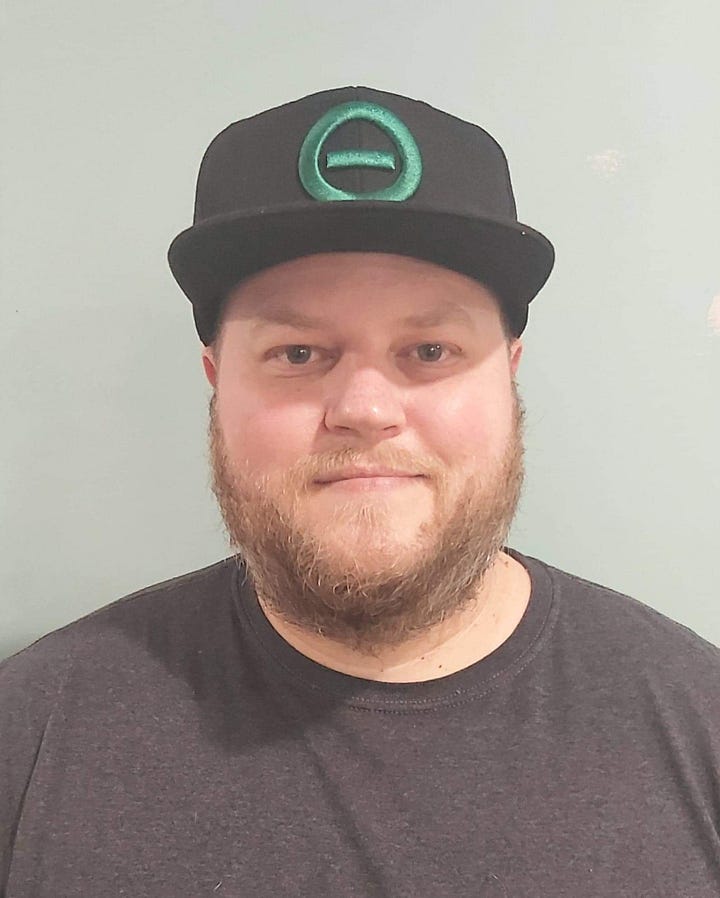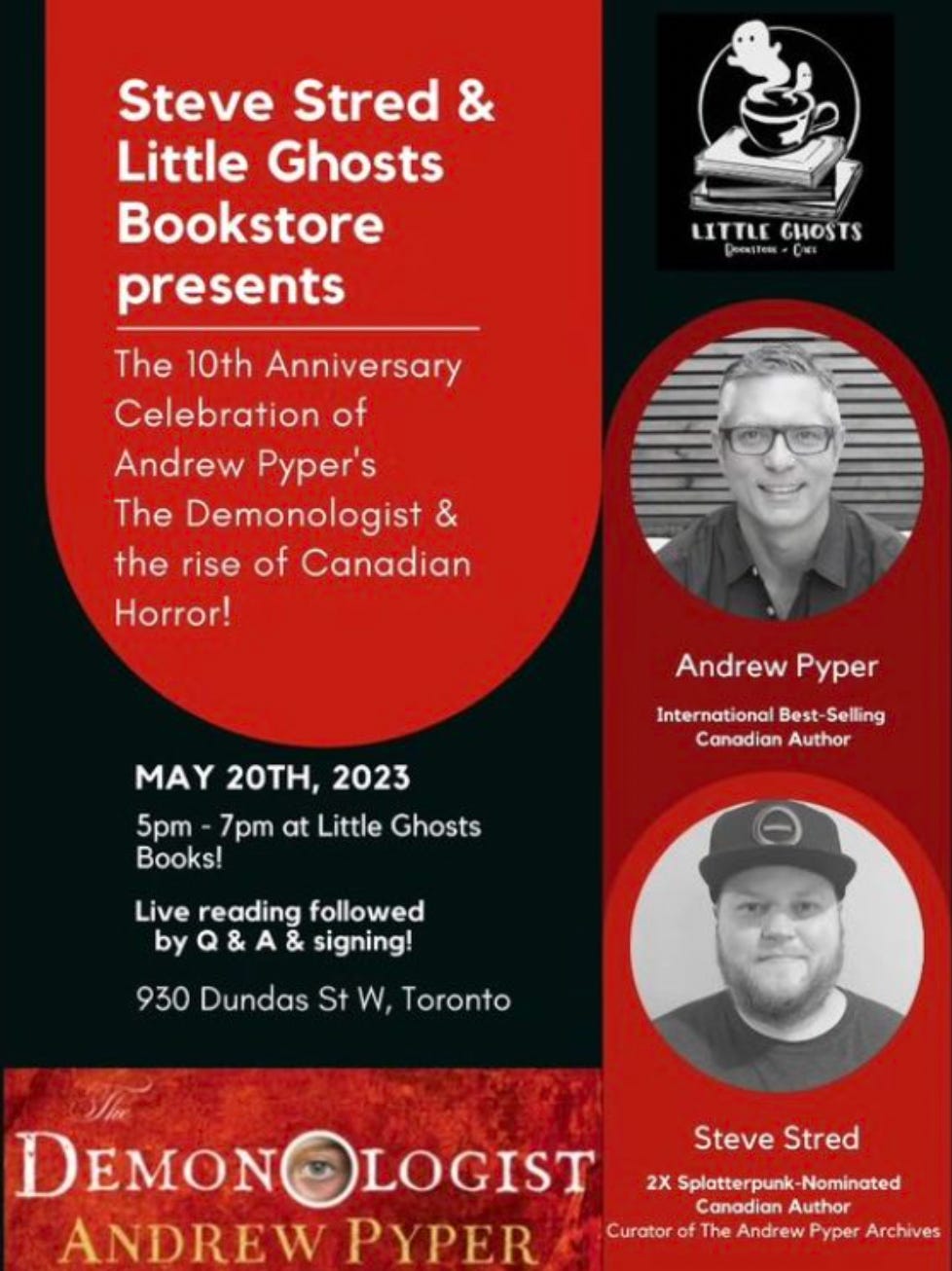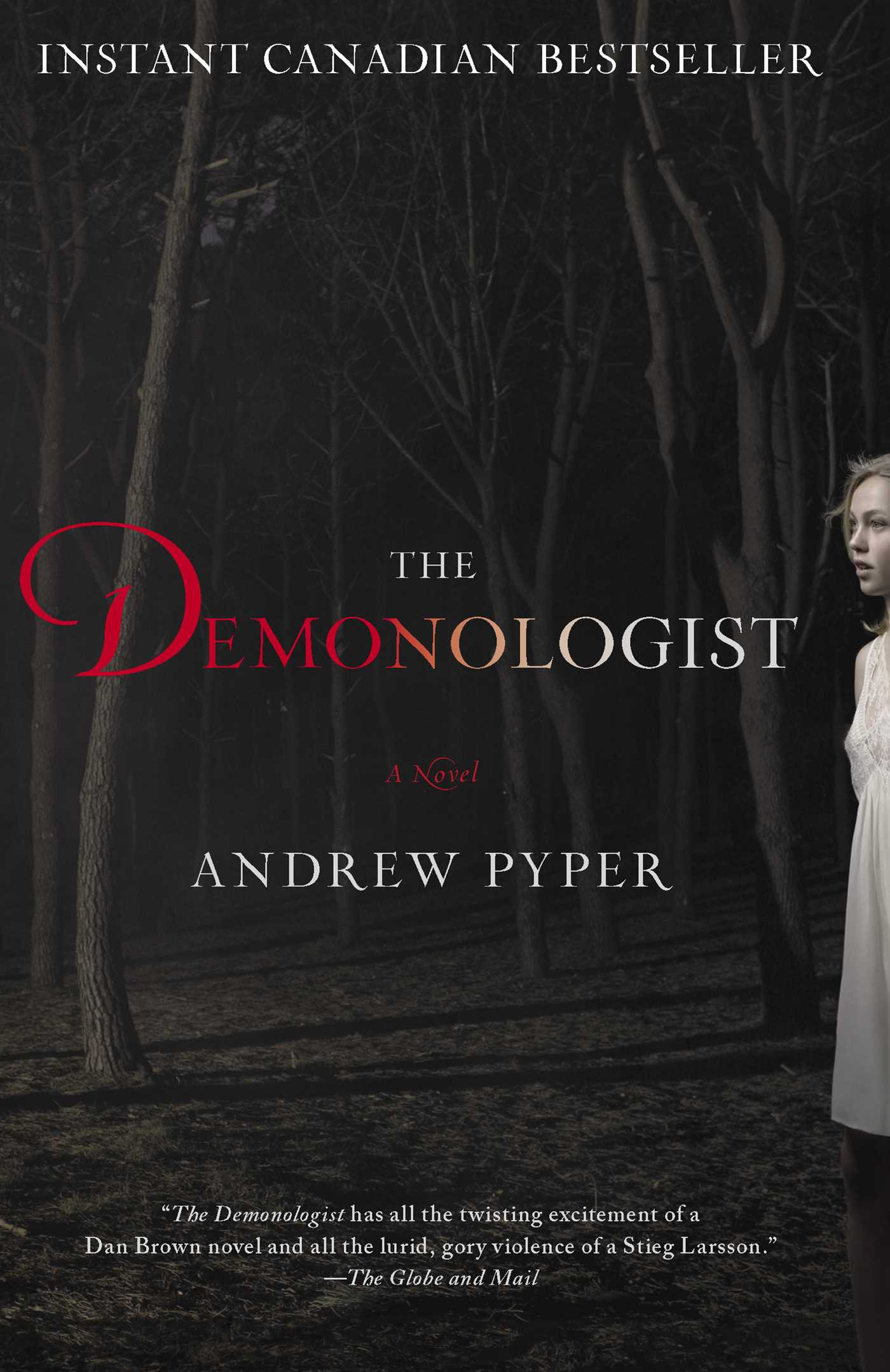Andrew Pyper and Steve Stred: The Veil Interview
On the healing and creative power of fandom and fiction


UPDATE: I’m not sure if Andrew Pyper had received his fatal cancer diagnosis when this interview was conducted. If he had, he didn’t let on, and it would have been out of character for him to bring it up anyways. Andrew, who died of cancer in January 2025 at the age of 56, was Old School in the best way. He was, to use a now gauche term, a gentleman: self-effacing, hard working, more likely to ask you about yourself than to volunteer personal details, and charming—the guy had a literal twinkle in his eye when he told a funny story, which was often.
Steve Stred, Boswell to Pyper’s Johnson, asked me to contribute to a published remembrance of Andrew. I include it below.
I first heard Andrew Pyper address the public at an author’s panel breakfast at the 2023 Canadian Book Expo. It was a thankless task for the authors, tasked to generate pre-publication excitement for fifty hungover booksellers and journalists slouched over their powdered eggs, warm coffee and mini croissants in an oxygen-starved convention room. Andrew was answering a question about the possibility of heroism in the postmodern novel, when he said something that I’ve never forgotten: “I try to create protagonists who, for all of their faults, are trying to be gentlemen.” I’ve read his work ever since though that lens. And though I did not get to know him as well as I would have liked, it was obvious every time I saw him that he did an incredible job of living up to that maxim off the page.
The Veil Interview
Can you believe it: Andrew Pyper’s The Demonologist, now published in over a dozen languages, turns ten this year. And Pyper’s biggest fan—who shares NO psychological traits with super-fan Annie Wilkes—wants to help you celebrate.
Edmonton’s Steve Stred, a celebrated novelist in his own right, is the founder and curator of The Andrew Pyper Archives, an amazingly in-depth bibliography of every novel, story, and audio story Pyper has published, along with links to interviews, media profiles, and short films and documentaries. Every May for the past several years, Stred has also been organizing “Pypermania,” which he describes as an “unofficial Canadian month-long celebration of my favourite author Andrew Pyper.”
This year Stred is celebrating Pypermania with a special event at Little Ghosts Bookstore, Toronto’s only bricks and mortar retail outlet devoted solely to horror. On Saturday May 20, Stred and Pyper will speak at the store, read from “The Demonologist,” talk about the rise of Canadian horror fiction over the last decade, and answer questions from the audience. You don’t want to miss it.
The Veil spoke with Stred and Pyper about the event, The Demonologist, Canadian horror fiction, and the growth of their relationship from fan-author to friends and fellow authors.
The Veil: Steve, you’ve written about your rather dramatic introduction to Andrew’s work. You’d left your full-time job to pursue bobsledding when you had a terrible accident that damaged your shoulder and hip. During the long recovery, you happened to pick up a paperback copy of The Demonologist and lost yourself in it. You also wrote about reading The Wildfire Season during your wife’s very difficult pregnancy. Looking back, why do you think Andrew’s work resonated with you so strongly right from the start?
Steve Stred: When I was a full-time athlete, our coaches used to make us keep a journal, but I only recently started journaling about my own life. And during that process I started to think back to how I came from a very very small town in the middle of nowhere. I didn’t have a lot of access to stuff outside my town when I was young—and keep in mind, this was mostly in the early Internet days—and I was also pretty resistant to cel phones when I got a little older. So when I found that copy of The Demonologist, not only was the cover so striking but on the back it talked about how Andrew is Canadian and lives in Toronto—I mean, it just blew my mind that something like that was possible! Up to that point I had very limited exposure to horror outside of Stephen King. I knew about Clive Barker, but only as a movie guy. So that limited worldview was one of the driving principles to my connection with Andrew’s work: that this beautifully written literary horror that spoke directly to a reader from the middle of nowhere in Canada.
There is also a shared connection because Andrew knows what life is like in small-town Canada,1 and you don’t get that in many of the other big international horror authors. If you do get small-town life in American horror or coming-of-age fiction, it’s all Friday Night Lights and football and cheerleading, and I don’t know what that’s like.
The Veil: Speaking as someone who had read a lot of horror fiction when I discovered Andrew’s work, around 2003 or so, I can tell you that there was very little of it being written in Canada. We had great mystery writers, sci-fi writers, suspense writers, but I can’t think of one “full time” Canadian horror author in the early 2000s. Horror was still considered almost…gauche.
Andrew Pyper: I think you’re right. We’re undoubtedly overlooking a few names from that time, but I can say with confidence that they wouldn’t have published by any of the big houses.
The Veil: Steve wrote in that same essay: “People often speak of Stephen King’s ‘writing voice’ as being so familiar and comforting. This was what happened when I cracked open the book and was introduced to David Ullman.”2 I agree with you about Andrew's writerly voice: it's very distinct and always draws me back to the work. For you, Andrew, knowing that horror readers expect certain tropes and archetypes and plot points, do you self-consciously try to distinguish your work through the voice? Have you tried to hone it over the years?
Andrew Pyper: Honestly, I think the short answer to that is, no. As time goes on and you collect a body of work, you’re probably going to be asked to speak about your work—on occasions like this, for example. So it’s interesting to think about things like voice, but I think that I self-consciously resist actively thinking about it too much. I do value the mystery involved in the whole writing process, and things like voice. Writing is a mysterious process to me, and one which I probably should deeply engage with but resist, and could possibly be investigated through deep psychotherapy, which maybe I should undergo—but, not to dodge the question, it’s not a process I think much about. Aside from saying, that even when I was writing my first collection of short stories (Kiss Me), which were not genre, or even when my first novel (Lost Girls) was taking shape as an obvious horror novel of sorts, even as that was happening right in front of my face, I was strangely naive about the implications of it. I thought I was writing a literary Canadian novel that would be in the same stream as all the other novels from big publishers. It was only after I finished it and gave it to my agent and people started saying, “Yeah, I like it, it’s strange how it combines all these genre elements.” The strangeness, the idea that what I was doing was strange, was news to me. It shouldn’t have been, but it was.
The Veil: I think you were way ahead of your time, there. Maybe because of a younger generation, one who grew up reading Stephen King and Philip K Dick, who now occupy high positions in publishing houses and media outlets, novels that blend genre and “literary” elements are definitely not looked at as strange anymore. Having said that, do you still get that response to your work, one that is slightly or downright disrespectful?
Andrew Pyper: Not disrespected, no. Certainly in the early days, I was more abrasive about the question of categorization of my work or, say, what panels I would be put on a books festival, which were always titled “Bloodbath!” or “Streams of Gore!” I didn’t feel above the work or my colleagues on the panels, but I did feel the prejudice behind the selectivity that went into the selection. I’m well past being personally troubled by that, but where there has been enormous change and improvement is in being able to utter the word “horror” as a genre you’re writing in and not be immediately deemed unpublishable. There is still hesitation, though. The publisher is thinking, Can we market this without using that word, horror?
The Veil: Do you find that same prejudice in regards to your work, Steve?
Steve Stred: Well, I work in a very different world than Andrew. Most readers are expecting my work to be brutal in spots. But maybe because I got such cover blurbs from Andrew and Shaun Hamill (Cosmology of Monsters) for my last novel (Mastodon), I did get some interest from agents about the book. But ultimately they said that they really liked it but that it was “too horror” for the publishers they work with. However, I have had one of those agents recently get back to me saying that they thought, given how well readers have responded, they might have missed the boat on representing it. So for me, that feels pretty good. That novel has done a lot for me in terms of name recognition. I mean, when I usually launch a book on Amazon I do it with one pre-order—from me—and I’m happy if I get ten reader reviews. That’s changing.
The Veil: Steve, how long ago did you launch the Andrew Pyper Archives?
Steve Stred: I guess, officially, it’s been about two years. Unofficially, it’s been five years, around the time I did the first Pypermania. It was just driving me crazy that people weren’t sharing Andrew’s work at the same level as so many other authors who get so much love all the time. That’s when I approached Andrew and asked if he’d mind if I shared some of his books and called it Pypermania. At the time, I’d really started to look into completing my own collection of Andrew’s work, all the overseas editions and that, so I’d started an Excel spreadsheet to keep track of everything I’d found. Around that time I saw that someone had started a website that archived the work of the British horror writer Guy N Smith, who has something like 400 short stories published. So I was like, Man, I have this spread sheet that my wife makes fun of all the time, why don’t I put it to use? So I started to put in all on WordPress and then my wife said I should approach Andrew and ask if he would help me out with the archive. I was afraid he’d block me for stocking him, but he was great!
The Veil: Is there like a Great White Whale of Andrew’s work you're still looking for?
Steve Stred: There was, but I got an email last night about my Great White Whale: the Russian edition of The Damned. I had a lead on it, but then Putin decided do some things he shouldn’t have, and I couldn’t order from Russia. Then five months ago I managed to contact a guy in Kazakhstan who runs an online bookstore about the Russian edition of The Demonologist, and we started to work out the logistics of how to get a book to Canada. It turns out that my cousin who lives in Czechia, the Czech Republic, can receive the book for me because they have no sanctions against Russian. So he received two copies and sent them to me. Now that same dealer has been able to get The Damned in Russian.
The Veil: Andrew, as a reader who was already following your work, The Demonologist was just your latest novel. But for you, the book’s success has obviously changed the trajectory of your career. Has that been largely positive for you?
Andrew Pyper: It’s been entirely positive. It’s no secret that the writing life is highly variable. There’s up and downs over the course of a writing career. The period prior to the publication of The Demonologist was a bit of a trough period for me, in terms of publishing in the US with any degree of enthusiasm. The Demonologist kind of corrected that for me. Its early submission generated interest in the States to a degree that I hadn’t experienced for a few books. And on a purely practical career level, it attracted and continues to attract film and TV development. Whether or not anything comes of that interest, that’s a revenue stream that’s entirely passive. It doesn’t require any work on my part. That was a mortgage-paying relief for a long time, and still is. So if you have a book that really turns around your career, one has a real affection for it. It was also my first book that was really and decidedly horror. It’s fully committed to that space in a way my previous books weren’t. So it was very freeing to write it that way and to see it perceived that way and to have so much success with it.
The Veil: Did it feel differently when you were writing it?
Andrew Pyper: Yes. Not to be too mystical about it, but the book felt very emotional and connected. It’s about a girl who goes missing in very fantastical circumstances—or the protagonist believes she has, anyways, that she’s been taken by a demon. So you could ask how such a fantastical situation could be so emotionally involving, but that’s not how emotions work. The novel is very informed by my connection with my daughter, who was roughly the same age as the girl in the novel, so the idea of the most terrifying thing being not only a threat to her but a threat that no one else but you can see, that you know the truth about something and yet that provides no help, that was nightmarishly difficult to live within while I was writing. So it was the most involving of all my books.
The Veil: Just to finish off, I wan’t to ask both of you: Do you believe in the supernatural?
Steve Stred: At this point, I have to say yes. Maybe because I have job based in the sciences (biomechanics), I’m inclined not to believe, but then knowing about my wife’s experiences of living in a haunted hotel as a little girl, and the things I learned when I was researching my novel about a cult—maybe you get so far into it that it gets under your skin and it makes you believe. For a long time I was into UFOs and ancient aliens and wanting to see photos of ghosts. I used to want to believe; now I do believe.
Andrew Pyper: I might fall five or six inches short of saying that I believe in the supernatural. I would say, having done a lot of research into various supernatural phenomena, and interviewed people who’ve had those experiences, that the sheer number of sane people with no history of involvement in, say, the occult, who have experienced things for which they can find no explanation for, or help with, is astounding. There’s just too many people of high capacity over the millennia who have experienced such things that have no explanation, I must leave some space for belief.
The Veil: So why horror, then?
Andrew Pyper: It’s always been an inclination. There’s no story that can’t be improved with a dead arm thrusting from the fresh soil of a grave. More seriously, horror lends opportunities to the writer not available in other forms. Horror and fear reveal character in a way you can’t reach otherwise. You learn something about people when you put people in those extreme circumstances. I love reading those situations and I love writing them.
Steve Stred: Pretty much the same. The stuff I was drawn to growing up, it always seemed to go toward those extreme situations, even if it was something like Tom Cruise in Legend or The Monster Squad. I was always drawn to the fantasy and horror. To this day, I have trouble watching, say, a movie about a race car driver: I know what’s happening and why it’s important, but it doesn’t draw me in. I’ve always wanted to know, What’s behind the door? Only horror gives you that.
Pyper was born and raised in Stratford, Ontario.
Ullman is the protagonist of The Demonologist.




